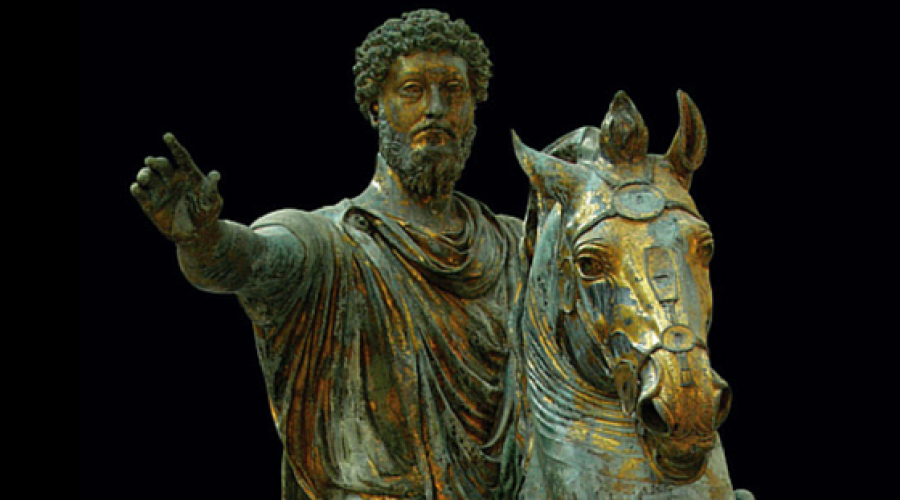
How to Read Marcus Aurelius's Books on Stoicism
How to Read Marcus Aurelius's Works on Stoicism
Estimated Reading Time: 10-12 minutes
Introduction
Marcus Aurelius, the Roman Emperor from 161 to 180 AD, is often celebrated as one of the most prominent Stoic philosophers. His work, Meditations, offers a profound glimpse into the mind of a ruler grappling with the complexities of life, duty, and personal ethics. Written as a series of personal reflections, Meditations serves not only as a philosophical treatise but also as a guide for self-improvement and resilience in the face of adversity.
Aurelius's unique position as a philosopher-king allows him to blend Stoic principles with practical leadership, making his insights particularly valuable. The historical backdrop of the Roman Empire, marked by wars, plagues, and political strife, adds a layer of urgency and relevance to his thoughts. In a world that often feels chaotic, Aurelius's reflections provide timeless wisdom that resonates today, reminding us of the importance of inner peace and rational thought.
Why Marcus Aurelius's Perspective Matters
What sets Marcus Aurelius apart from other Stoic thinkers is his deeply personal approach to philosophy. Unlike philosophers who wrote in abstract terms, Aurelius's Meditations are intimate and candid, reflecting his struggles, doubts, and aspirations. His insights are not merely theoretical; they are grounded in the realities of his life as a leader facing immense challenges.
Aurelius's thoughts on Stoicism emphasize the importance of self-discipline, the acceptance of fate, and the cultivation of virtue. His perspective differs from that of earlier Stoics like Seneca or Epictetus, who focused more on rhetoric and moral philosophy. Instead, Aurelius's writings are practical, offering actionable advice that can be applied to everyday life. This accessibility has allowed his ideas to endure through centuries, influencing countless individuals seeking guidance in their personal and professional lives.
Overview of Recommended Books
Meditations
Meditations is divided into twelve books, each containing a series of reflections that Aurelius wrote for himself rather than for publication. This personal nature gives the text an authenticity that resonates with readers.
Main Themes and Arguments
-
Impermanence and Acceptance: Aurelius frequently reflects on the transient nature of life, urging readers to accept what they cannot control. He writes, "You could leave life right now. Let that determine what you do and say and think."
-
The Importance of Reason: Rational thought is central to Aurelius's philosophy. He emphasizes the need to align one's thoughts with nature and reason, stating, "The happiness of your life depends upon the quality of your thoughts."
-
Virtue as the Highest Good: For Aurelius, living a virtuous life is paramount. He advocates for integrity, justice, and self-control, asserting that these qualities lead to true fulfillment.
-
Interconnectedness of Humanity: Aurelius often reflects on the idea that all humans are part of a larger community. He writes, "What is not good for the hive is not good for the bee," highlighting the importance of collective well-being.
Historical Context and Significance
Written during a time of personal and political turmoil, Meditations serves as a testament to Aurelius's commitment to Stoic philosophy amidst adversity. His reflections were penned while he was on military campaigns, facing the challenges of leadership and personal loss. This context enriches the text, as it reveals how Stoicism can be a source of strength in difficult times.
Key Insights and Takeaways
- Practice Mindfulness: Aurelius encourages readers to remain present and aware, a practice that can help mitigate anxiety and foster resilience.
- Embrace Challenges: He suggests viewing obstacles as opportunities for growth, a core tenet of Stoic thought.
- Cultivate Gratitude: Aurelius often reflects on the importance of appreciating the good in life, regardless of circumstances.
- Live According to Nature: Understanding and accepting the natural order of the world can lead to peace of mind.
Why Read This Book:
Meditations is essential reading for anyone interested in Stoicism because it encapsulates the philosophy's core principles through the lens of a ruler's personal experiences. It is particularly beneficial for those seeking practical wisdom applicable to modern life, offering insights that can help navigate personal challenges and foster emotional resilience.
Key Themes and Sections
Aurelius's Meditations can be explored through several key themes and sections that collectively provide a comprehensive understanding of Stoicism:
-
Self-Reflection: The work begins with Aurelius's introspective thoughts, emphasizing the importance of self-awareness and personal growth.
-
Nature and the Universe: Throughout the text, he reflects on the cosmos and our place within it, encouraging readers to align their lives with the natural order.
-
Ethics and Virtue: A significant portion of the work is dedicated to discussions of moral character, virtue, and the importance of living a good life.
-
Dealing with Adversity: Aurelius offers strategies for coping with hardship, including the acceptance of fate and the cultivation of inner strength.
-
Community and Humanity: His reflections often touch on the interconnectedness of all people, urging readers to act in the interest of the greater good.
The progression of ideas throughout Meditations illustrates how Aurelius builds upon foundational Stoic concepts, leading readers toward a holistic understanding of the philosophy.
Who Would Benefit from Reading This Book
Meditations is ideal for a diverse audience:
- Students and Academics: Those studying philosophy or history will find Aurelius's insights invaluable for understanding Stoicism's impact on Western thought.
- General Readers Interested in Stoicism: Beginners will appreciate the accessible nature of Aurelius's reflections, which are grounded in real-life experiences.
- Professionals Seeking Practical Wisdom: Individuals in high-stress environments can benefit from Aurelius's strategies for maintaining composure and ethical integrity.
- Anyone Looking for Personal Growth: Readers seeking self-improvement will find actionable advice that can be applied to various aspects of life.
Recommended Reading Order
To maximize your understanding of Meditations, consider the following approach:
-
Begin with Book 2: This book contains some of Aurelius's most practical advice on dealing with difficult people and situations, setting a solid foundation for the rest of the text.
-
Focus on Book 4: Here, Aurelius delves into the nature of the universe and the importance of accepting fate, which is crucial for understanding Stoic acceptance.
-
Advanced Study in Book 6: This section discusses the interconnectedness of humanity and the importance of virtue, providing deeper insights into Aurelius's ethical framework.
To get the most out of this foundational work, maintain a journal to reflect on your thoughts and responses to Aurelius's teachings, allowing for a more personal engagement with the text.
Conclusion
Marcus Aurelius's Meditations stands as a monumental work in the realm of Stoic philosophy, offering timeless wisdom that continues to resonate with readers today. His reflections on self-discipline, acceptance, and the pursuit of virtue provide a roadmap for navigating life's challenges with grace and resilience.
As you explore Aurelius's thoughts, consider how they can be applied to your own life. Engage with the text, reflect on its teachings, and allow its insights to inspire personal growth. The enduring relevance of Aurelius's ideas serves as a reminder that, even in the face of adversity, we can cultivate a life of purpose and tranquility.
Featured Books

Meditations
by Marcus Aurelius
Published: 180
A timeless Stoic classic, Meditations is the personal journal of Roman Emperor Marcus Aurelius, offering clear and practical reflections on discipline, resilience, and how to live with purpose. Written nearly 2,000 years ago, its insights on self-control, adversity, and inner peace remain deeply relevant today.